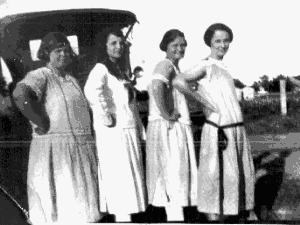EDUCATION IN PINE ISLAND

The first elementary school in Pine Island was built on the north side of Brumlow road, across from the intersection of Betka road. It was replaced in 1919 by a new two room school that was built about a half mile east of the old school, just east of the Pine Island Baptist church on Brumlow road. After the students finished the first eight grades in the elementary school, if a student wanted to continue their education they had to either make the trip to Hempstead everyday, or live with kinfolk's, or board in Hempstead during the week, to attended the Hempstead High School.
The new elementary school was one big room that was divided into two rooms by folding doors. Each half had it's own book room and cloak room. The folding doors could be opened to make a large room to present school plays or for community events. The outhouse that was built behind the school and the well in the school yard provided for the physical necessities and a coal/wood stove warmed the building in the winter. A shed was built east of the building for the teachers buggy and horse.
The first, second, third and fourth grade classes were held in one room and the fifth, sixth, seventh and eighth grade classes were held in the other room. The new school had one new feature the students liked, each child had their own desk instead of having to share a double desk like they had to do at the old school.
Miss Annie (Taylor) was one of the teachers at the old school. Miss Dot and Miss Willie Bethany from Hempstead also taught at the old school and moved to the new one when it opened. Miss Willie taught the lower grades and Miss Dot taught the upper grades. Other teachers at the new school were Miss Gertrude and Miss Addie Mitchell from the Shiloh community, Charlene Blumberg from the Gladish community, Ora Roberson from the Gladish area, and Alma Lee Weathers from Pearsall and Alice Kelly who taught the first grades.
John Wesley Pennington was the school trustee from Pine Island in the 1893/1894 term after three school districts, Pine Island, Pioneer and Waller, were merged to reduce administrative personnel and expenses.
In 1911 the town of Waller held an election and created the Waller Independent School district and Pine Island became Pine Island District No. 18. Harry Lee Milam was a Trustee in the 1917/1918 term. He was one of the designers of the new two room Pine Island schoolhouse that opened in 1919 after his death.
That school district continued operation until it was consolidated with the Waller Independent School District and closed forever in the 1927/28 school year.
Higher education was available, for a few years, in Waller when the South Texas Baptist College opened there in September of 1898 with 3 students and closed the school year with 30. It started the second year with 15 students and ended the school year with 102. A new two story frame building was built in 1899 on land donated by Edwin Waller. On September 10, 1900, the "1900 Hurricane" damaged the building so severely that the college was never reopened.
Black education is discussed separately here, only because it was a separate undertaking in those days.
Colonel Jared E. Kirby and his wife Helen Marr (Swearingen) built a beautiful mansion in about 1860. The house was built in the Greek Revival style, of yellow pine brought in from sawmills located in Montgomery, Texas. The house even included copper lined wooden bath tubs and large brick cisterns for a water supply, but as was the tradition of the times, the kitchen was in a separate building. It was located on 1,000 acres east of the Liendo plantation and north of the "Old Houston Highway.
The land was given to Helen by her father, Dr. Swearingen. They called the plantation "Alta Vista". After Jared's death and the loss of the slave labor force following the Civil War, the debts begin to eat away the plantation's lands and farms. In order to survive, Mrs. Kirby, who was an 1855 graduate of Wesleyan College, turned the mansion into a boarding school for girls.
The new school opened March 11, 1878 with eight female students. The name had been translated from the Spanish Alta Vista to the English Prairie View. The new students did not stay very long and the school closed.
In 1879 a provision of the Texas state constitution passed by an Act of the Texas legislature in 1879, authorized the state to build an Agricultural and Mechanical College for colored youth as a branch of Texas A.& M. University. The school was reopened in 1879 as Prairie View Normal School, as a college to train black teachers.
The plantation's mansion was the first building in the new college. The name was changed in 1889 to the Prairie View Normal and Industrial College and later to Prairie View University. The mansion remained as one of the school's buildings until it was demolished in 1933.